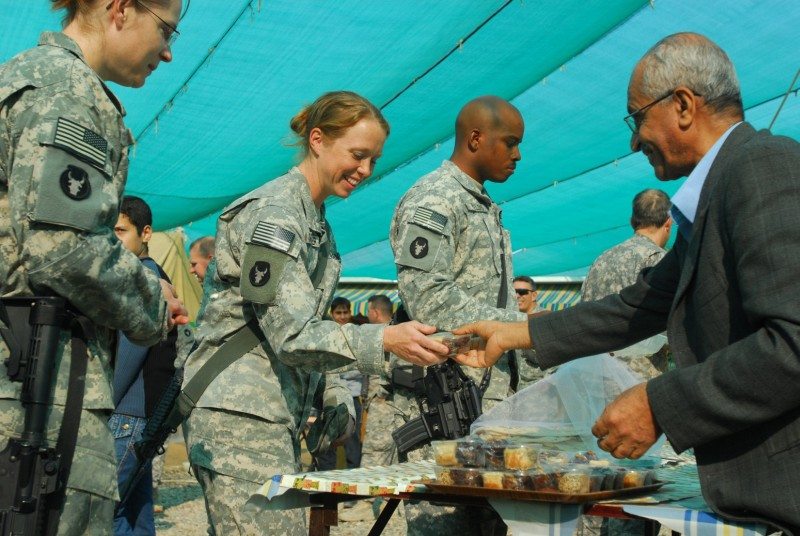Pizzas, sodas and doughnuts are off the menu at some US Army bases as new recruits are being weaned off fast food for healthier fare, which the military believes will make them better soldiers.
The military’s culinary revolution is on display at a mess hall at Fort Benning, Georgia, where the young troops, with their assault rifles slung over their shoulders, file past a breakfast buffet in silence.
To help them choose a balanced meal, green, yellow and red labels indicate the nutritional value of each dish.
Grapes, apples and melon slices get a healthy green label. Old staples such as scrambled eggs are still served, but with a yellow label, Bacon also qualifies as yellow, though it’s turkey instead of pork.
Cheese receives a red color code, while pastries and cakes are nowhere to be found.
The soldiers, most of them under the age of 21, seem to be embracing the healthier dishes. After an hour of exercise outdoors before dawn, their plates are piled high with fruit, yogurt and granola.
Before they joined the military, the soldiers had fast food about four to seven times a week, said Lieutenant General Mark Hertling of the Army’s Training and Doctrine Command.
“That’s a lot of fat,” Hertling said.
After seeing the physical condition of incoming recruits steadily decline over the past decade, the army launched the effort to introduce a healthier diet to new soldiers.
“In the mid-90s, most US primary and secondary schools eliminated mandatory fitness education at school. At about the same time, the technology explosion occurred with gaming, people playing with their hands instead of going out running and jumping,” Hertling said.
The result: obesity among 17- to 24-year-olds has increased from 14 to 23 percent in the past 10 years, according to the Centers for Disease Control and Prevention.
And the junk food diet has helped narrow the pool of potential military recruits.
About 75 percent of possible recruits are not able to serve in uniform because of a lack of education, arrest records or mental problems, while about 25 percent are ruled out because they are physically unfit, the general said.
Even among those who are accepted, one in five recruits still need to shed pounds to meet the army’s standards, said Command Sergeant Major Robert Boudnik, who oversees the mess hall.
The new regime seems to work, he said. “I’ve seen soldiers losing 70 pounds through basic training,” said Boudnik, still sweating from morning exercises.
For lunch and dinner, French fries, pizzas and hot dogs have been scrapped. Sugary sodas are banished as well, but the soldiers don’t seem too bothered as they guzzle down brightly colored energy drinks instead.
The new approach to the mess hall, which at the moment only applies to bases that conduct basic training, has grabbed the attention and praise of First Lady Michelle Obama, who has tried to promote healthier habits amid an epidemic of obesity.
She paid a visit Thursday to Fort Jackson in South Carolina, where General Hertling briefed her on the army’s new approach to food and fitness.
The first lady came away impressed, saying the initiative could serve as a model for civilian society.
Hertling said the program was not out to force soldiers to eat healthy foods.
“You can’t control lifestyle, you just try to influence it,” he said.
After eating with his 200 comrades, 20-year-old Reid Reifschlager, from Houston, Texas, said he liked his new diet.
“It’s true, we don’t eat a lot of junk food, but the food is good,” he said. “Since I’m here I feel more energized.”











